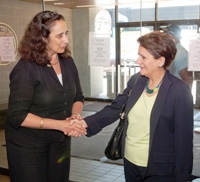
The state of Michigan's chief health care officer toured the Wayne State University School of Medicine this week.
Olga Dazzo, director of the Michigan Department of Community Health, met with Dean Valerie M. Parisi, M.D., M.P.H., M.B.A., and her leadership team Thursday to learn more about how the school works to meet the health care needs of Michigan residents, both in the Detroit region and across the state.
During her visit to the campus, Dr. Dazzo toured the Richard J. Mazurek, M.D., Medical Education Commons, as well as the Perinatology Research Branch of the National Institutes of Health, which has helped more than 20,000 women vulnerable for giving birth prematurely.
"We want to explore opportunities where we can work more closely with the Michigan Department of Community Health," Dean Parisi told Dazzo. "We can be a great help to the department."
Dazzo learned that the WSU School of Medicine graduates more doctors annually than the University of Michigan and Michigan State University combined. And, a substantial number of those new doctors remain in Michigan to practice medicine, a boon to a state with a projected shortage of physicians.
The School of Medicine, Dean Parisi explained, is a research powerhouse that rapidly translates lab findings to practical medical treatment. One recent example of that translation is the finding by PRB researchers that the use or progesterone in women with a shorter cervix can delay premature birth, resulting in healthier mothers and infants, and a reduction in long-term health care costs that might otherwise be required to care for children born prematurely.
Dean Parisi also explained the Wayne State University Area Health Education Center, a joint program between the School of Medicine and the WSU School of Nursing. The program seeks to interest K-12 students in all health fields, and keep them working toward a college degree. It also works to entice those students and new health care professionals to remain in Michigan to practice their specialties, be it nursing, pharmacology or as a physician. The project concentrates on expanding interest in the medical fields and retaining experts in underserved, rural areas of the state.
Dazzo said that the assistance of the School of Medicine and its graduates will be "critical" when another 400,000 Michigan residents are added to Medicaid rolls in 2014 as a result of national health care reform legislation. "The question is, how do we negotiate through that period of adjustment," she said.
The faculty of the School of Medicine and the Wayne State University Physician Group already provide $60 million in uncompensated care annually to the uninsured and underinsured residents of the Detroit region. That experience and care will be invaluable as the state prepares to meet the health care challenges on the near horizon.